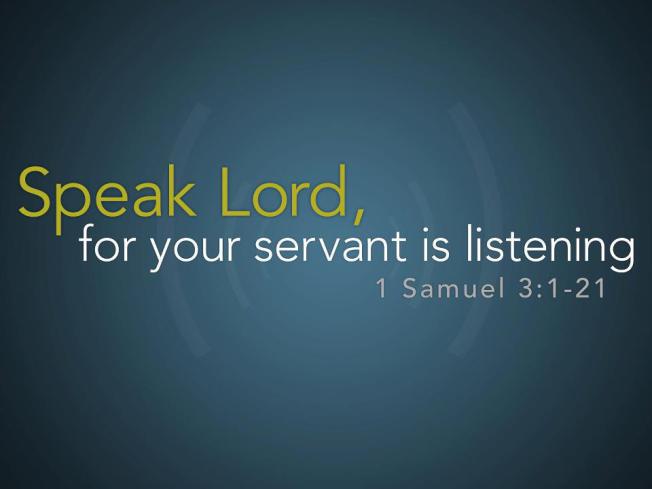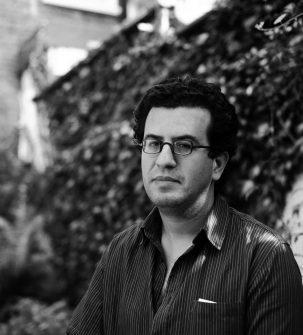“The Lord Calls”

1 Samuel 3:1-20 (3:10) – January 14, 2018
When I was a young child growing up on the northwest side of Chicago, every once in a while I would hear my mother and my aunts talk about my great-aunt Bertha, my grandmother’s older sister. Sister Bertha. She was an actual “Sister.” She was a Catholic nun, from a local area convent in the Chicago suburbs.
Sister Bertha had taught school for all the years of her active service to God. She must have been a particularly stern teacher. I only remember seeing her one time, at the convent retirement home where she was living, on the occasion of her 90th birthday. She certainly had a commanding presence. I was about eight or nine years old, and I could definitely sense that sternness about her.
My great-aunt Bertha and the other nuns—and Catholic and Orthodox priests, and other Protestant ministers, for that matter—had a calling. They have been “called” by God. I know that I have been “called” by God, too. But, what exactly does that mean?
In both Scripture readings today, we hear about the call of God. From the Hebrew Scriptures in 1 Samuel, the young Samuel is called. In the Gospel of John, several disciples are called. Again, what is this “call” we are talking about?
We turn to our reading from 1 Samuel 3, starting with the first verse. “The boy Samuel was serving God under Eli’s direction. This was at a time when the revelation of God was rarely heard or seen.” There was little written down from God—only some laws handed down from Moses. You can’t just go home and pick up your personal copy of the Old Testament or Psalms and Proverbs to read. And God rarely—if ever—spoke to people at that time. God-sent visions were extremely rare, too. I love the Hebrew word for “rare.” It means “precious.”
“In biblical Hebrew, the descriptor of “rare/precious” is typically reserved for an item like jewelry, the idea of something extremely valuable due to pure lack of supply.” [1]
Do we begin to have some sort of idea how valuable—how rare and precious it was for anyone to hear from God, the Lord Almighty, who made heaven and earth? If we are abandoned to total silence from God, that must be a very sad time, indeed. And, what does this reading say about the boy Samuel? “Now Samuel did not yet know the Lord: The word of the Lord had not yet been revealed to him.”
Ah, now young Samuel enters the scene. He works in the special tent where God’s special presence is located, where the special wooden Ark of the Covenant with the Ten Commandments inside. Samuel is the High Priest’s assistant, serving in the Tabernacle.
Reading more from this passage: “and Samuel was lying down in the house of the Lord, where the ark of God was. 4 Then the Lord called Samuel. Samuel answered, “Here I am.” 5 And he ran to Eli and said, “Here I am; you called me.” But Eli said, “I did not call; go back and lie down.” So he went and lay down.
6 Again the Lord called, “Samuel!” And Samuel got up and went to Eli and said, “Here I am; you called me.” “My son,” Eli said, “I did not call; go back and lie down.”
Samuel still doesn’t know who is calling him—by name. Similarly, when God’s voice comes to us today, can we make it out through the roar? “There are many voices competing for our attention and how many of us can say that we really know God well enough to recognize a word as being from God or someone else?” [2] Can we recognize the voice of God calling us?
Let’s return to my initial question, the question I started this sermon with. What is a “calling?” We will turn to the dictionary. One definition is “a vocation, profession, or trade.” My husband is an editor. I have a friend who is a photo-journalist. Other people are nurses, or mechanics, or accountants, for example. That is their calling, their daily work in life.
However, in this sermon, the definition that is most important to us today is the second one: a call or summons, especially when accompanied by conviction of divine influence. We turn to our Gospel lesson for today, from John, chapter 1.
“The next day John was back at his post with two disciples, who were watching. He looked up, saw Jesus walking nearby, and said, “Here he is, God’s Passover Lamb.” 37-38 The two disciples heard him and went after Jesus. Jesus looked over his shoulder and said to them, “What are you after?” They said, “Rabbi” (which means “Teacher”), “where are you staying?” 39 He replied, “Come along and see for yourself.” They came, saw where he was living, and ended up staying with him for the day. It was late afternoon when this happened.”
John, his brother James, and their friend Andrew all followed Jesus, and they all acknowledged Him as Messiah. What do we have here? A call or summons, especially when accompanied by conviction of divine influence. That is how the disciples started to follow Jesus! They received the call, the invitation. The summons.
That is how nuns, priests, ministers, and every other person follows Jesus, as well—especially when accompanied by repeated conviction of divine influence. They receive a call.
I’d like everyone to turn to the back page of today’s bulletin. See the listing of all the people who take part in ministry here at our church? What leads the listing? Who are the ministers at our church? All St. Luke’s members, that’s who. All of us are ministers of God. The Lord has called each one of us into God’s service.
Let us see what happens to Samuel. We see that the high priest Eli finally gets the message. It is the Lord calling in the night, not Eli himself. Wisely, Eli tells Samuel what to do and how to answer when the call comes again. And, the call does indeed come again. The Lord came and stood there, calling as at the other times, “Samuel! Samuel!”
Samuel’s response to God? “Then Samuel said, “Speak, for your servant is listening.” We can all take comfort in the fact that God didn’t give up on Samuel. The Lord called, called, and called again. How many times has the Lord needed to call to us? God called until Samuel learned how to listen. How long has God been calling your name, and mine?
God doesn’t just call us to gather us in heavenly arms of comfort. Well, yes, we are God’s beloved children. The Lord greatly desires all to come, to follow. But, that is not all! God also calls us—we are offered the opportunity and experience to work for God. Not to get on the Lord’s “good side” or to gain “brownie points,” but we serve in gratitude and appreciation for all we have been given. Also important, we have the opportunity to respond to the goodness and love of the Lord for each one of us.
Since the late 1990’s, millions of people across the United States “have celebrated Dr. King’s legacy by turning their community concerns into volunteer service and ongoing citizen action on King Day and beyond.” Martin Luther King Jr. gave us an encouraging example. “Life’s most urgent question is: What are you doing for others?”
Global Citizen is “a non-partisan organization dedicated to promoting civic engagement, community volunteering, civic responsibility, and sustained active citizenship among diverse groups, particularly young people. Global Citizen promotes democracy building, voter education, and participation, locally and globally.” [3]
Houses of worship across the country have partnered with this organization in a day of service commemorating Dr. King—service where we reach out to others in need with a hand of assistance, support, and encouragement. What a marvelous way to reach out with the love of Christ. Have you heard God’s call? Yes, God’s call of love, and yes, God’s call to serve.
Speak, Lord. Your servant is listening.
[1] http://www.workingpreacher.org/preaching.aspx?commentary_id=2305
Commentary, 1 Samuel 3:1-10, Roger Nam, Preaching This Week, WorkingPreacher.org, 2015.
[2] Commentary on 1 Samuel 3:1-10 [11-20]http://www.workingpreacher.org/preaching.aspx?commentary_id=1185 Callie Plunket-Brewton
[3] http://mlkdayofservice.org/about-the-greater-philadelphia-martin-luther-king-day-of-service/
@chaplaineliza
(Suggestion: visit me at my regular blog for 2018: matterofprayer: A Year of Everyday Prayers. #PursuePEACE – and my other blog, A Year of Being Kind . Thanks!)
Advertisements Share this:




